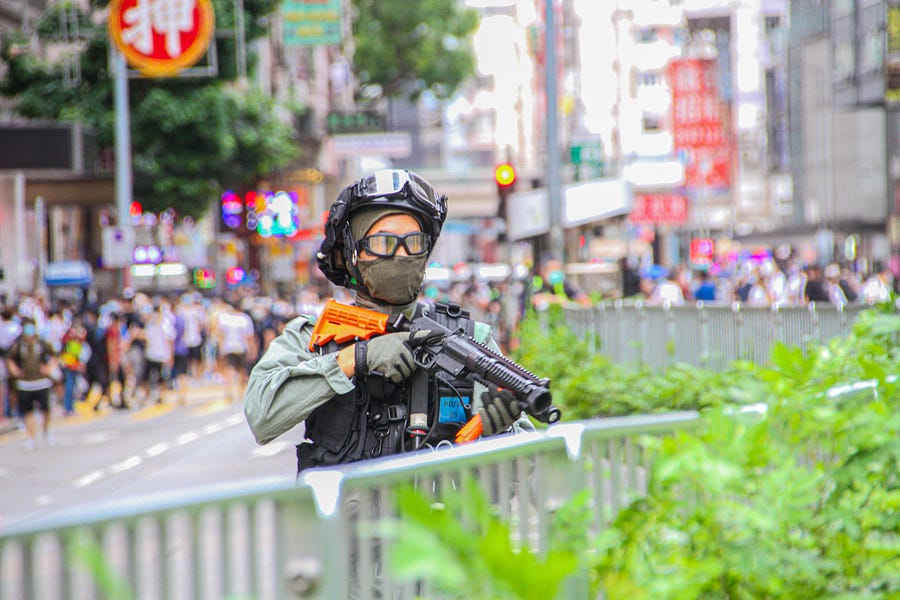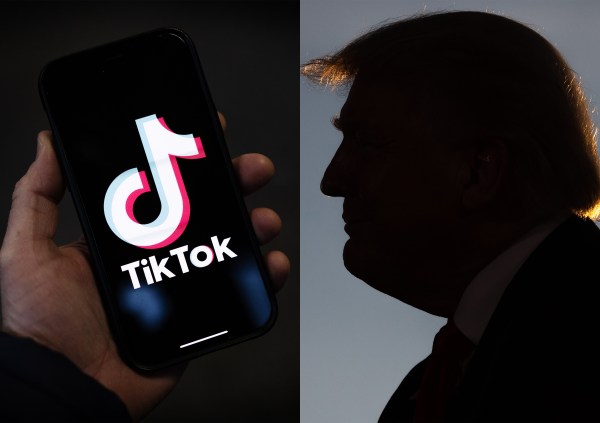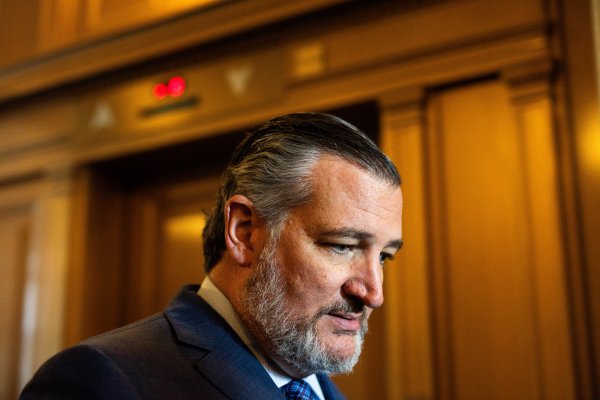As Americans prepare to celebrate our independence this weekend, citizens of Hong Kong are dangerously close to losing theirs. After a year of historic pro-democracy protests in response to Beijing’s 2019 extradition bill, Chinese President Xi Jinping officially enacted a national security law on Tuesday aimed at stamping out dissent in Hong Kong once and for all.
The sweeping legislation was shrouded in secrecy for the 40 days between its introduction and passage, and its reveal confirmed the worst fears of Hong Kong leaders and activists. With more than 60 articles—which cover secession, subversion, terrorism, and collusion with foreign entities—it continues the worrisome trend of China’s constraint of civil liberties in the region. Mass demonstrations in response to the law erupted on Wednesday, July 1—the anniversary of Hong Kong’s independence from British colonial rule—in the city’s largest display of resistance this year.
As a stipulation of the territory’s return to China from British rule in 1997, Hong Kong had previously enjoyed a semi-autonomous state characterized by the maxim “one country, two systems.” As a special administrative region, Hong Kong managed its own courts, currency, and extradition. However, according to Margaret Lewis, an expert in Chinese law at Seton Hall, this system increasingly looks more like “one country, 1.5 systems.” Many view the national security law as another step toward the end of Hong Kong’s economic and legal sovereignty.
The law paves the way for Beijing’s intrusion into Hong Kong’s long history of judicial independence, allowing for the introduction of China’s repressive legal practices. It sets up extensive administrative networks to investigate and prosecute various vague offenses thought to undermine the Chinese government.
But the law’s power lies less in its specific legalese and more in its damage to Hong Kong’s already dwindling civil liberties.
“China is criminalizing what, in places like the United States, and most countries in the world, would be considered normal discourse,” Fred Rocafort, a legal expert on China and a former diplomat, told The Dispatch.
“What’s important to remember is that this law is another arrow in Beijing’s quiver. It’s another way to deprive people of liberty under the guise of law,” said Lewis, “And whether that arrow is pulled out and used a lot or a little, it still is an affront to the freedom that Hong Kong and all people should enjoy.”
In reference to these fundamental freedoms now at risk, Lewis also brought up Liu Xiaobo—a Chinese activist and Nobel Peace Prize laureate who died in Chinese custody in 2017. “He served a very long prison sentence for his entirely peaceful advocacy of alternative political viewpoints,” she said, “And that just goes to show how broadly Beijing interprets national security concerns, subverting state power, and these other offenses, which are now being applied to Hong Kong through the national security law.”
Vaguely defined offenses combined with harsh penalties enable the legislation to inspire maximum fear among protesters. And that’s the point. The law gives leeway to Chinese officials and their Hong Kong partners to practice discretion and target dissent broadly. This tactic draws less international backlash, requires less manpower, and provokes less local resistance than violence. Life imprisonment is laid out as a possible punishment for “grave” offenses under the law, but is not explicitly defined, inviting maximum sentencing.
Derek Scissors, an expert on China at the American Enterprise Institute, told The Dispatch that scare tactics play a key role in the legislation. “The goal for the Chinese here is not to arrest 10,000 people. It’s to scare all these people into doing what China wants without any arrests,” he said, “The idea here is to intimidate them. And that’s why you write the law in this very vague fashion so that everybody realizes it could apply to me.”
New administrative bodies to oversee the enforcement of the law are crucial in inspiring this atmosphere of paranoia. The legislation lays out a national security committee within Hong Kong’s government that reports back to the Chinese government and acts outside of the confines of local law. In some cases, the resulting trials are held behind closed doors, away from the public and media coverage.
The 2019 extradition bill, which was suspended after protests, would have permitted Hong Kong’s chief executive to extradite criminals wanted for crimes in China back to the mainland. The new law expands on the 2019 extradition bill by allowing defendants who commit an offense in Hong Kong to be tried in China, where practices like torture, coerced confessions, and wrongful convictions are frequently used against perceived enemies of the state. “The idea of having Hong Kongers hauled away to the mainland to stand trial for actions that took place in Hong Kong—to be prosecuted by mainland prosecutors and judged by mainland judges—is an absolutely horrifying prospect,” says Rocafort.
The law’s fourth and final offense—sedition—demonstrates the Communist Party of China’s conspiratorial fear of Western interference in the region. Under the legislation, collusion with foreign entities is subject to life imprisonment. “A person who steals, spies, obtains with payment, or unlawfully provides State secrets or intelligence concerning national security for a foreign country or an institution,” the law reads “or directly or indirectly receives instructions, control, funding or other kinds of support… shall be guilty of an offense.”
These measures also target foreigners working within or on behalf of Hong Kong. Foreign journalists, organizations, and government officials can be deported from or prosecuted upon arrival to Hong Kong or mainland China.
The Trump administration has promised retaliation in response to the law through a series of punishments leveled against Chinese officials, including the suspension of defense equipment exports and visa restrictions. In a statement on Wednesday, Secretary of State Mike Pompeo warned, “The United States will not stand idly by while China swallows Hong Kong into its authoritarian maw.”
Although he concedes the sincerity of Pompeo’s aversion to China’s recent oversteps, Scissors doubts the Trump administration’s eagerness to counter Xi Jinping. President Trump, he said, is unwilling to compromise his economic ambitions in China in order to stand up for human rights. “If the president continues to hold on to the Phase One trade deal, he’s not going to allow meaningful action against the Chinese over Hong Kong, unless they provoke him with open violence,” he tells The Dispatch, “And the whole point of the national security legislation is to not have to use open violence.”
So the question becomes: Will Beijing temper its aggression toward Hong Kong in response to a new administration? Democratic presidential nominee Joe Biden released a statement condemning Trump’s inadequate response to Xi Jinping’s human rights violations in Hong Kong and elsewhere. “Trump’s record on Beijing’s human rights abuses is indefensible, marked by desperation for a failing trade deal, fealty to Xi Jinping, and an open admission that he’s willing to turn a blind eye to even the worst atrocities,” the statement reads.
But Biden hasn’t built a reputation as a leader willing to get tough on China. And the international response to the national security law has amounted to little more than sympathetic rhetoric.
Hong Kongers have a long history of defending their own sovereignty and civil liberties. Nearly 400 people were arrested during the Wednesday protests, including 10 under the new national security law. Despite China’s increasingly aggressive crackdown, “Liberate Hong Kong, revolution of our time,” remains a cry in the streets of the city.
Photograph byTommy Walker/NurPhoto via Getty Images.







Please note that we at The Dispatch hold ourselves, our work, and our commenters to a higher standard than other places on the internet. We welcome comments that foster genuine debate or discussion—including comments critical of us or our work—but responses that include ad hominem attacks on fellow Dispatch members or are intended to stoke fear and anger may be moderated.
With your membership, you only have the ability to comment on The Morning Dispatch articles. Consider upgrading to join the conversation everywhere.